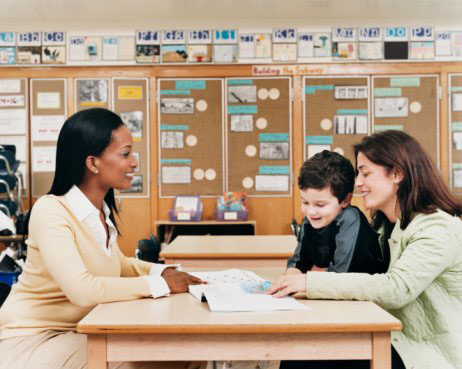
IEP Tips – Parent and Teacher Conference
The single most important source of information on your child’s progress is the classroom teacher. The teacher talks with you after school, at the IEP meeting, and at consistently scheduled conferences. The teacher completes your child’s progress reports and corresponds back and forth with you. The teacher talks with the school psychologist, the physical therapist, the speech and language therapist, the resource specialists and administrators about your child’s needs and progress, and then the teacher communicates with you.
The abundance of information between you and the teacher will depend mainly upon your relationship with one another. If the teacher perceives you as a proactive parent who also understands the needs and problems of a teacher, and if you believe the teacher can teach your child effectively, you will probably receive plenty of up-to-date, specific information about your child’s progress. But how do you as a parent develop this cooperative relationship with your child’s teacher? You may wish to try some of the following suggestions:
- Try to develop a personal relationship with your child’s teacher. Let the teacher know that you are working together with them as a partner in educating your child.
- Give the teachers and specialists sufficient time to get to know your child before asking their opinions about your child’s progress, problems, the appropriateness of the program, and so forth.
- Let the teachers and specialists know you understand the difficulties they frequently face in doing their jobs – be empathetic to their needs, too!
- Prepare for conferences in advance by developing and bringing with you a list of questions, concerns, and comments. This saves everybody time and ensures that nothing important will be overlooked.
- Let teachers and specialists know what is important to you in the education and development of your child.
- Discuss and share your plan for monitoring your child’s IEP, and follow through with that plan.
- Discuss problems you believe have arisen in implementing the IEP with the teachers and specialists involved. Don’t begin by going right to the school administrators.
- Consider ways you might volunteer time or materials for the classroom.
As these relationships are developed and strengthened, you will experience more and more confidence in your ability to know and understand your child’s progress and the extent to which her IEP is actually being implemented.
_________________________________________________________________________________________________________
Karina Richland, M.A. is the Founder and Director of PRIDE Learning Centers, located in Los Angeles and Orange County. Ms. Richland is a certified reading and learning disability specialist. Ms. Richland speaks frequently to parents, teachers, and professionals on learning differences, and writes for several journals and publications. You can reach her by email at karina@pridelearningcenter.com or visit the PRIDE Learning Center website at: www.pridelearningcenter.com
